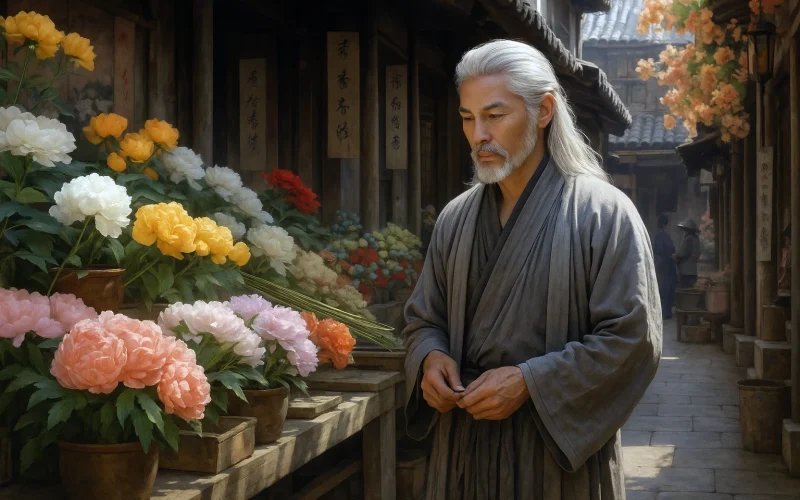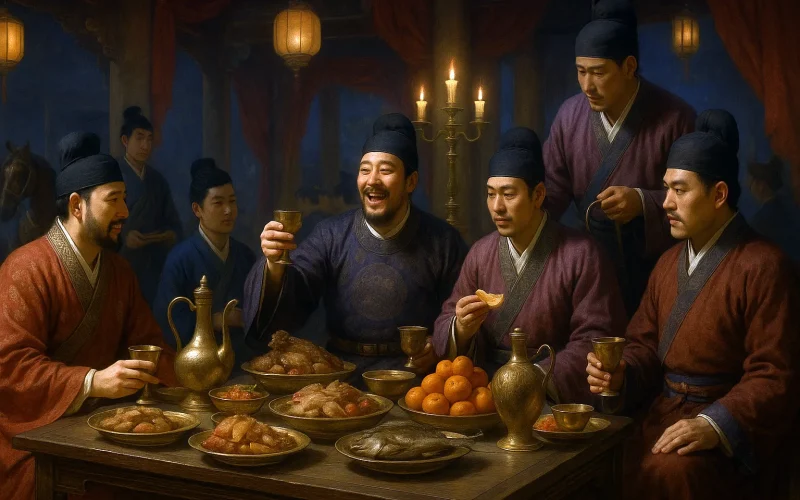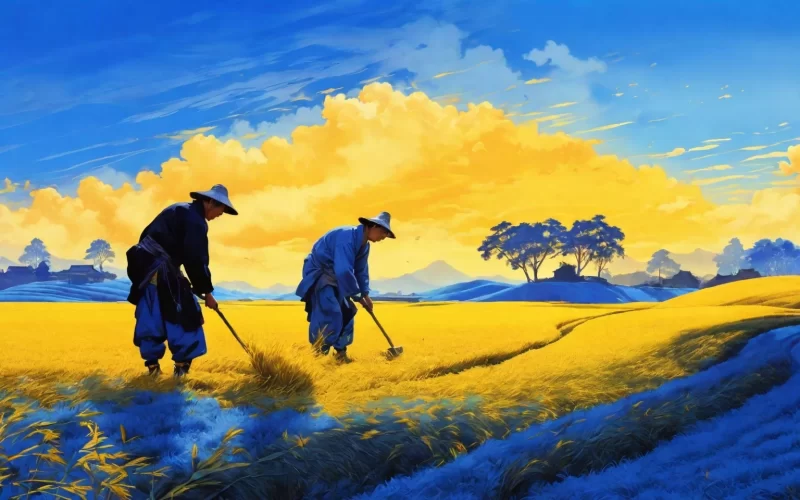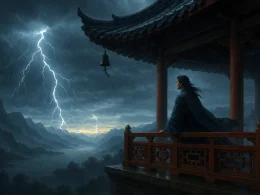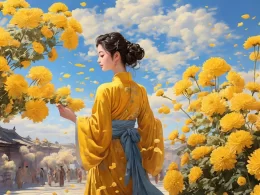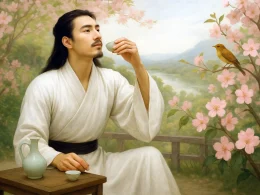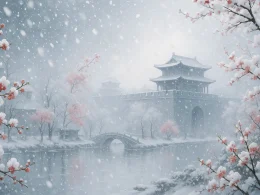The capital's in parting spring,
Steeds run and neigh and cab bells ring.
Peonies are at their best hours
And people rush to buy the flowers.
They do not care about the price,
Just count and buy those which seem nice.
For hundred blossoms dazzling red,
Twenty-five rolls of silk they spread.
Sheltered above by curtains wide,
rotected with fences by the side,
Roots sealed with mud, with water sprayed,
Removed, their beauty does not fade.
Accustomed to this way for long,
No family e'er thinks it wrong.
What's the old peasant doing there?
Why should he come to Flower Fair?
Head bowed, he utters sigh on sigh
And nobody understands why.
A bunch of deep-red peonies
Costs taxes of ten families.
Original Poem:
「买花」
白居易
帝城春欲暮,喧喧车马度。
共道牡丹时,相随买花去。
贵贱无常价,酬直看花数。
灼灼百朵红,戋戋五束素。
上张幄幕庇,旁织巴篱护。
水洒复泥封,移来色如故。
家家习为俗,人人迷不悟。
有一田舍翁,偶来买花处。
低头独长叹,此叹无人喻。
一丛深色花,十户中人赋。
Interpretation:
The poem "Buying Flowers" is the tenth piece in Bai Juyi's collection Qinzhong Yin, written around 810 during the reign of Emperor Xianzong of Tang. This series of poems reflects Bai Juyi's profound observations of social injustices in Chang'an. Through direct expression, he exposes societal contradictions. "Buying Flowers" specifically contrasts the extravagant flower-buying habits of the wealthy in the capital with the struggles of ordinary people, illustrating the sharp reality of wealth disparity in the Tang Dynasty.
1st Couplet: “帝城春欲暮,喧喧车马度。”
(The bustling streets of the capital are filled with the noise of carriages and horses as spring draws to an end.)
This couplet sets the scene in the imperial capital and subtly hints at societal decay with the metaphor of fading spring. The vivid description of noise and movement captures the lively atmosphere of flower shopping, laying the foundation for the poem's theme.
2nd Couplet: “共道牡丹时,相随买花去。”
(People claim it is the season of the peony and eagerly head out together to purchase flowers.)
Here, the enthusiasm for peonies reflects the wealthy's pursuit of trends and materialistic indulgence. Their collective passion reveals a shallow, fashion-driven lifestyle.
3rd Couplet: “贵贱无常价,酬直看花数。”
(The price of peonies varies greatly, determined solely by the number of blooms.)
The couplet critiques the irrationality of valuing flowers purely based on quantity. It subtly mocks the capriciousness and extravagance of the wealthy, who dictate the market.
4th Couplet: “灼灼百朵红,戋戋五束素。”
(A cluster of radiant red peonies costs five bundles of fine silk.)
The vibrant imagery of the flowers contrasts starkly with the concrete representation of their cost. The excessive price underscores the absurdity of the rich’s frivolous spending.
5th Couplet: “上张幄幕庇,旁织巴篱护。”
(The flowers are carefully sheltered under canopies and surrounded by woven fences for protection.)
This couplet illustrates the meticulous attention the wealthy devote to preserving their flowers, highlighting their superficial priorities and pretentious demeanor.
6th Couplet: “水洒复泥封,移来色如故。”
(The roots are watered and sealed with mud, ensuring the flowers remain as vibrant as before.)
The detailed description of the transplantation process exemplifies the effort invested in such luxuries, further emphasizing the extravagant lifestyle of the elite.
7th Couplet: “家家习为俗,人人迷不悟。”
(Every household adopts this as a custom, and everyone blindly indulges in it.)
The widespread practice of flower-buying exposes a societal obsession with vanity and extravagance, critiquing the normalization of such superficial pursuits.
8th Couplet: “有一田舍翁,偶来买花处。”
A farmer from the countryside happens to pass by the flower market.
Introducing the farmer provides a poignant contrast between the rural poor and the urban elite, setting the stage for the poem’s critique of social inequality.
9th Couplet: “低头独长叹,此叹无人喻。”
(The old farmer lowers his head, sighing deeply, though no one understands his lament.)
The solitary sigh of the farmer reflects his helplessness and sorrow, embodying the voiceless suffering of the impoverished.
10th Couplet: “一丛深色花,十户中人赋。”
(A single cluster of vibrant flowers costs as much as the taxes from ten households of average farmers.)
This powerful line delivers a cutting critique of societal inequality, juxtaposing the indulgence of the rich with the immense burden placed on ordinary citizens.
Writing Features:
- Structural Layers: The poem is divided into two sections: the first focuses on the extravagance of the rich, while the latter shifts to the farmer’s perspective, creating a sharp contrast.
- Contrast Technique: The juxtaposition of the affluent and the impoverished magnifies the stark social disparities.
- Detail-Oriented Imagery: The meticulous depiction of flower buying and transplantation makes the opulence of the elite vividly tangible.
- Pointed Conclusion: The final couplet sharply critiques the disparity by connecting luxury with the heavy taxation burden on the common people.
Overall Appreciation:
"Buying Flowers" vividly captures the stark realities of wealth disparity in the Tang Dynasty. Through detailed depictions of flower markets and the extravagance of the elite, juxtaposed with the quiet despair of the farmer, Bai Juyi delivers a scathing critique of societal inequity. The final line, equating a single cluster of flowers to the taxes of ten households, encapsulates the poem’s theme, serving as a stark reminder of the burdens borne by the poor. The poem’s clarity, simplicity, and biting tone exemplify Bai Juyi’s mastery of socially conscious poetry.
Insights:
This poem underscores the profound consequences of wealth disparity and resource misallocation. Bai Juyi’s portrayal of the silent suffering of the common people contrasts sharply with the extravagance of the wealthy, illustrating the ethical and societal dangers of such inequalities. It reminds us that the pursuit of luxury and vanity often comes at the expense of the marginalized, urging us to reflect on the broader implications of unchecked privilege and societal neglect.
Poem translator:
Xu Yuan-chong (许渊冲)
About the poet:
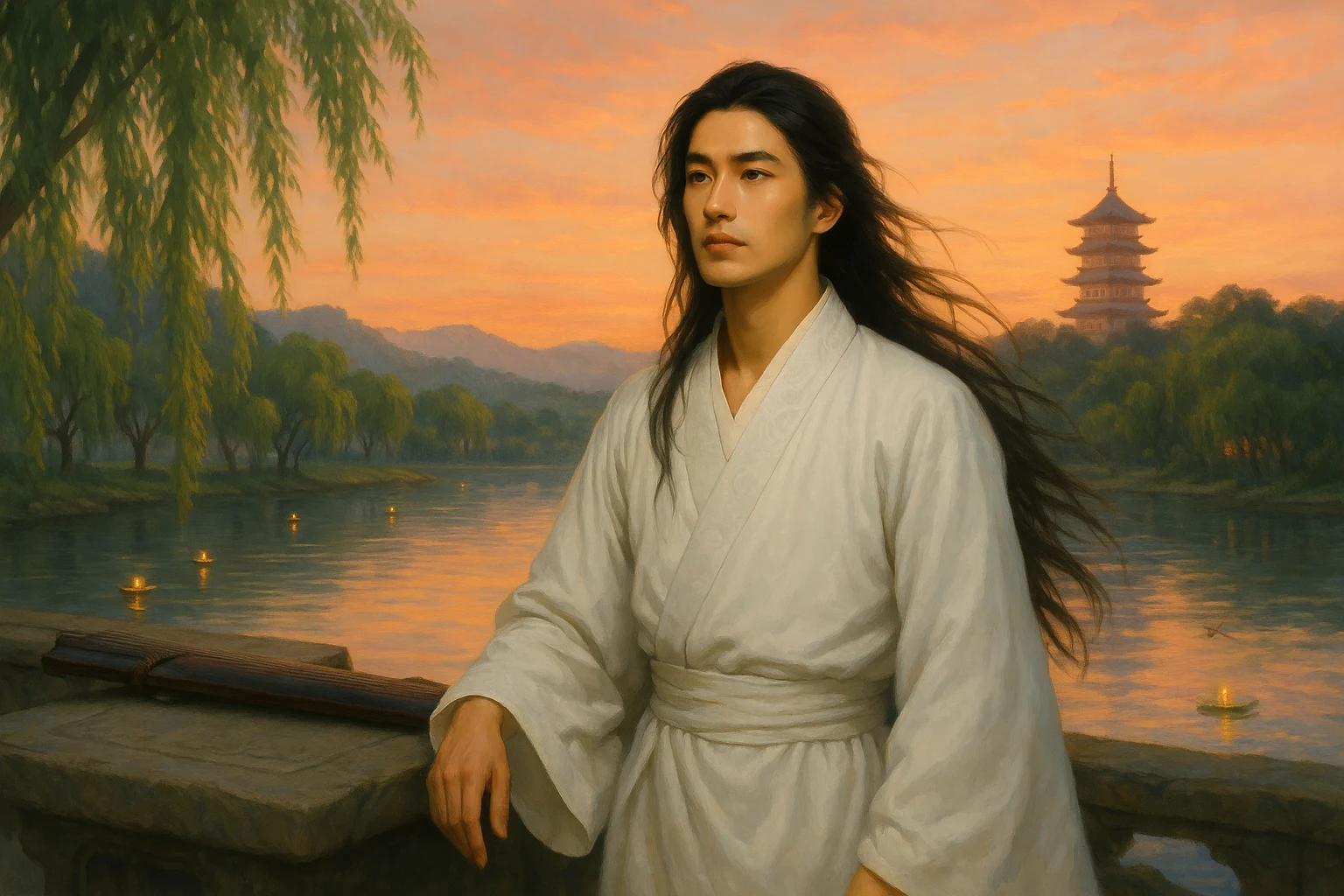
Bai Juyi (白居易), 772-846 AD, was originally from Taiyuan, then moved to Weinan in Shaanxi. Bai Juyi was the most prolific poet of the Tang Dynasty, with poems in the categories of satirical oracles, idleness, sentimentality, and miscellaneous rhythms, and the most influential poet after Li Bai Du Fu.






